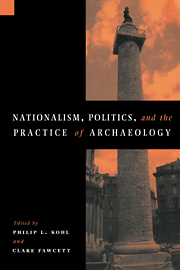Book contents
- Frontmatter
- Contents
- List of maps
- List of contributors
- Acknowledgments
- Part I Introduction
- Part II Western Europe
- 2 Civilization, barbarism, and nationalism in European archaeology
- 3 Archaeology and nationalism in Spain
- 4 Nationalism and Copper Age research in Portugal during the Salazar regime (1932–1974)
- 5 Archaeology in Nazi Germany: the legacy of the Faustian bargain
- 6 Nazi and eco-feminist prehistories: ideology and empiricism in Indo-European archaeology
- Part III Eastern Europe and Eurasia
- Part IV East Asia
- Part V Commentary
- Bibliography
- Index
6 - Nazi and eco-feminist prehistories: ideology and empiricism in Indo-European archaeology
Published online by Cambridge University Press: 06 October 2009
- Frontmatter
- Contents
- List of maps
- List of contributors
- Acknowledgments
- Part I Introduction
- Part II Western Europe
- 2 Civilization, barbarism, and nationalism in European archaeology
- 3 Archaeology and nationalism in Spain
- 4 Nationalism and Copper Age research in Portugal during the Salazar regime (1932–1974)
- 5 Archaeology in Nazi Germany: the legacy of the Faustian bargain
- 6 Nazi and eco-feminist prehistories: ideology and empiricism in Indo-European archaeology
- Part III Eastern Europe and Eurasia
- Part IV East Asia
- Part V Commentary
- Bibliography
- Index
Summary
This study presents a case of interpretive abuse. One unfortunate archaeological data set has been forced to yield two diametrically opposed interpretations in the service of two ideological movements, one heinous (the Nazis) and one innocent (eco-feminism). Oddly, both interpretations share the same theoretical and logical form; it is only a politically motivated reversal of the “good” and the “bad” that separates them. Neither interpretation can be empirically justified. Sadly, the archaeological and linguistic matter lying quietly at the root of this disagreement – the archaeological identity of the ancient speakers of Proto-Indo-European – offers unprecedented access to the ideals, beliefs, and symbolic structures of a truly remote prehistoric society. A robust body of linguistic research on Proto-Indo-European language, social organization, and comparative mythology presents to archaeologists what is probably the richest collection of knowledge of its kind anywhere in the world. But the history attached to the subject has prompted many scholars to avoid it out of suspicion, a situation which has bred ignorance and indifference within most of the archaeological community.
Indo-European linguistics and archaeology have been exploited to support openly ideological agendas for so long that a brief history of the issue quickly becomes entangled with the intellectual history of western Europe. The search for Indo-European origins began in the nineteenth century within the same intellectual circles that spawned today's hermeneutic and ideologically based doubts about rationality and objective understanding.
- Type
- Chapter
- Information
- Nationalism, Politics and the Practice of Archaeology , pp. 82 - 96Publisher: Cambridge University PressPrint publication year: 1996
- 1
- Cited by

